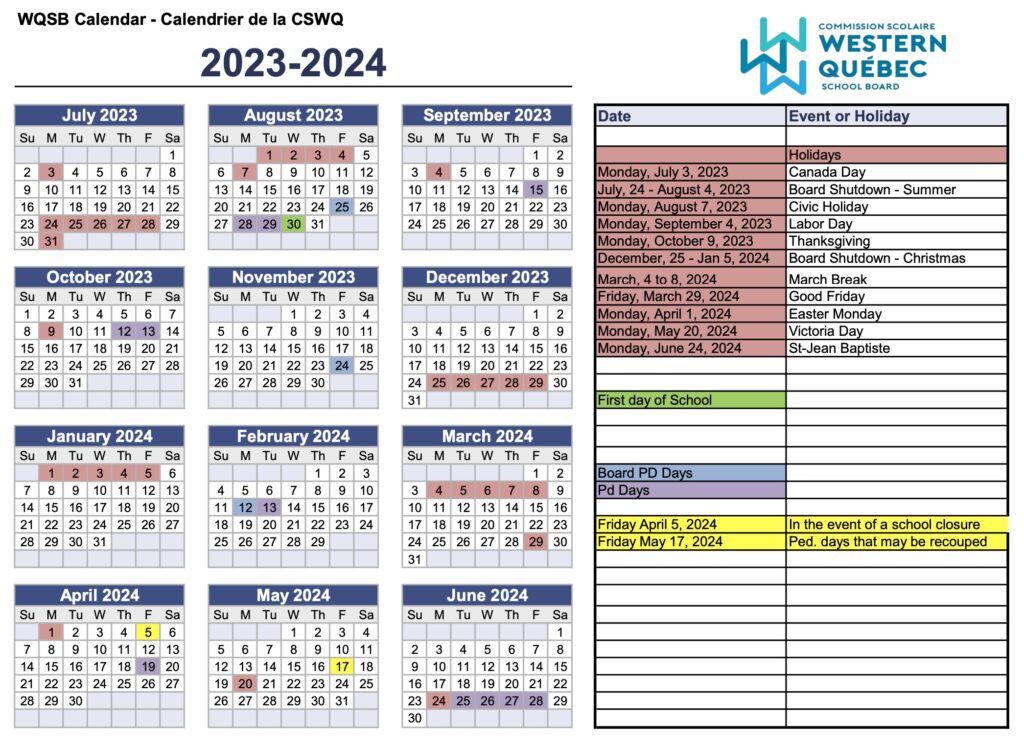Welcome to your ultimate guide to the calendrier scolaire 2023-2024 Canada. As a parent, teacher, or student, having a comprehensive understanding of the academic calendar is crucial for planning your year effectively. From major holidays and public events to regional variations in school dates, this article has everything you need to know for the upcoming school year.
Understanding the Academic Calendar
As a student or parent, understanding the academic calendar is crucial to planning your year. The Canadian educational calendar 2023-2024 is structured in a way that allows schools to take breaks during certain periods, such as for holidays and professional development days.
What is an Academic Calendar?
An academic calendar is a timeline that outlines the key dates for the school year, such as the start and end dates of each term, exam periods, holidays, and breaks. The academic calendar helps students and parents plan their schedules and stay informed about upcoming events and deadlines.
Key Features of the Academic Calendar
The academic calendar for the Canadian school year 2023-2024 includes several key features that are important to note. These features include:
| Feature | Description |
|---|---|
| Start and End Dates | The official start and end dates of the school year, including the dates for each term or semester. |
| Holidays and Breaks | The dates for all public holidays and school breaks, which may vary depending on the province or territory. |
| Professional Development Days | The dates when teachers and staff have professional development opportunities, which may result in cancelled classes or early dismissal for students. |
By understanding the key features of the academic calendar, students and parents can plan accordingly and avoid any scheduling conflicts.
Key Dates for Canadian Schools
Planning ahead is essential for a successful school year. To help you get organized, we’ve compiled a comprehensive list of the most important dates for the 2023-2024 school year in Canada. Make sure to mark these dates on your calendar so that you and your child are well-prepared for the school year ahead.
| Date | Event |
|---|---|
| September 5, 2023 | Labour Day (holiday) |
| September 6, 2023 | First day of school |
| October 9, 2023 | Thanksgiving Day (holiday) |
| December 23, 2023 – January 7, 2024 | Winter break (inclusive) |
| February 19, 2024 | Family Day (holiday) |
| March 11-15, 2024 | March break |
| April 19, 2024 | Good Friday (holiday) |
| April 22, 2024 | Easter Monday (holiday) |
| May 20, 2024 | Victoria Day (holiday) |
| June 28, 2024 | Last day of school |
In addition to these dates, there may be professional development days or other events specific to your child’s school or school board. Make sure to check with your school for any additional dates that may be relevant to your child’s academic year.
Planning Your Year: School Year Planner
Planning is crucial to success, and having a school year planner or academic timetable can help you stay on top of assignments, extracurricular activities, and important school dates. Here are some tips to help you effectively plan your academic year:
- Start by marking down all the important dates, such as the start and end of the school year, holidays, and breaks.
- Note any important deadlines for assignments, projects, or exams.
- Add any extracurricular activities or commitments, such as sports practices or club meetings.
- Consider setting short-term and long-term academic goals for the year, and mark down milestones to help you achieve them.
- Use color-coding or symbols to make it easier to differentiate between different types of activities or events.
Using a school year planner or academic timetable can help you stay organized, reduce stress, and avoid missing important deadlines or events. Start planning early to make the most out of your academic year.
Canadian School Holidays
During the 2023-2024 school year, Canadian schools will observe several holidays, providing students and teachers with much-needed breaks throughout the year. These holidays offer ample opportunities to unwind and spend time with family and friends.
| Holiday | Date(s) | Duration |
|---|---|---|
| Labour Day | September 4, 2023 | 1 day |
| Thanksgiving | October 9, 2023 | 1 day |
| Winter Break | December 21, 2023 – January 5, 2024 | 2 weeks |
| Family Day | February 19, 2024 | 1 day |
| Spring Break | March 18, 2024 – March 29, 2024 | 2 weeks |
| Good Friday | April 19, 2024 | 1 day |
| Easter Monday | April 22, 2024 | 1 day |
| Victoria Day | May 20, 2024 | 1 day |
| Summer Break | June 28, 2024 – September 2, 2024 | 10 weeks |
It’s worth noting that some school districts may observe additional holidays or have slight variations in dates. As such, it’s important to check the specific school calendar for your region to ensure you have the most up-to-date information.
Regional Variations in School Dates
It is important to note that school dates may vary by province or territory in Canada. Each region has its own specific school calendar, determined by various factors such as climate, cultural events, and local needs. For example, some provinces may have a longer winter break to accommodate winter weather, while others may have a shorter break but additional days off throughout the year for regional holidays.
If you are new to a region or unsure of your school’s calendar, there are resources available for parents and students to access. The Ministry of Education for each province or territory typically publishes the school calendar online, which you can find by searching for your region’s name followed by “school calendar” or “academic dates.” Many schools also provide a copy of the calendar to students and their families at the beginning of the school year, so be sure to check with your school office if you have any questions.
Planning for Transition Periods
Transition periods, such as moving from one grade to another or transitioning from elementary to secondary school, can be challenging for students and parents alike. To ensure your child has a smooth transition, it’s important to plan ahead.
Start by communicating with your child’s teacher or school counselor about any upcoming changes and how you can support your child during this time. Encourage your child to discuss their feelings and concerns about the transition, and provide reassurance and guidance along the way.
Supporting Your Child’s Education
As a parent or guardian, your support is crucial to your child’s education. Here are some tips to help you create a positive learning environment and maintain open communication with your child’s teachers:
- Be involved: Attend parent-teacher conferences, school events, and volunteer opportunities to stay informed about your child’s education and demonstrate your support.
- Establish a routine: Help your child establish a consistent routine for homework, studying, and bedtime to promote good habits and academic success.
- Encourage reading: Make reading a regular part of your child’s routine and provide access to a variety of books and reading materials to foster a love of learning.
- Communicate with teachers: Stay in touch with your child’s teachers to address any concerns or questions about their academic progress and ensure that you are working together to support your child’s learning.
- Provide a space: Create a dedicated space for homework and studying that is free from distractions and equipped with necessary materials like pens, paper, and a calculator.
- Encourage curiosity: Foster your child’s natural curiosity by encouraging them to ask questions, explore new ideas, and pursue their interests both in and out of the classroom.
“Parents are a child’s first teacher and their best advocate. By working together, parents and teachers can provide the best possible learning experience for every child.”
Extracurricular Activities and School Dates
While academics are essential, extracurricular activities play an important role in a student’s development. They provide opportunities for students to develop new skills, build relationships with peers and mentors, and explore interests outside of the classroom. However, it can be challenging to balance these activities with the demands of the academic calendar.
One way to manage extracurricular activities is to carefully prioritize and plan. Encourage your child to choose activities they are genuinely interested in and that align with their long-term goals. Help them create a schedule that balances their academic commitments with their extracurricular pursuits. This can involve setting realistic expectations and boundaries, such as limiting the number of clubs or sports teams they participate in.
It’s also important to stay informed about the specific dates and times of extracurricular activities. Many clubs and teams have set practice schedules that may conflict with academic events. Make sure to coordinate with coaches, sponsors, and other mentors to avoid conflicts as much as possible.
Finally, remember that extracurricular activities should be a supplement to academics, not a substitute. Encourage your child to stay on top of their schoolwork and prioritize their education. With the right balance and planning, extracurricular activities can enrich your child’s academic and personal growth.
Looking Ahead: Future School Dates
While it’s crucial to stay informed about the calendrier scolaire 2023-2024 Canada, it’s also essential to look ahead to future school years. Being aware of upcoming school dates can help parents, teachers, and students plan for the long term and avoid any potential scheduling conflicts.
Many school boards and districts release their academic calendars well in advance, so it’s crucial to take note of when this information becomes available.
Bookmarking relevant websites and subscribing to email or text alerts can help ensure you stay updated on future school dates.
It’s also essential to be aware that the school calendar is subject to change. Unexpected events, such as extreme weather conditions or pandemics, may result in adjustments to the academic calendar.
Being flexible and prepared for these changes can help minimize any disruption to your child’s education.
Adjustments and Changes to the School Calendar
While schools strive to adhere to the academic calendar, there may be times when adjustments or changes need to be made. These changes could be due to unforeseen circumstances such as weather-related closures or other unexpected events. In the case of adjustments or changes to the school calendar, schools will communicate these updates to parents and students as soon as possible.
It is important for parents and students to remain informed and flexible in case of any adjustments or changes to the school calendar. Schools may use a variety of communication channels, including email, text messages, school websites, and social media platforms, to notify families about any updates. Parents and students should actively monitor these channels for any announcements or changes that may affect the school schedule.
Conclusion
Planning the academic year can be a daunting task, but having access to the calendrier scolaire 2023-2024 Canada can make things a lot easier. By understanding the academic calendar and key dates for Canadian schools, parents, teachers, and students can effectively plan their year and make the most of their time.
Remember to use a school year planner or academic timetable to keep track of important dates and activities. And don’t forget to support your child’s education by creating a positive learning environment at home and maintaining open communication with teachers.
Stay Informed and Flexible
It’s important to keep in mind that adjustments or changes to the school calendar can happen, so staying informed and flexible is crucial. Make sure to bookmark this article for future reference and refer to it throughout the school year for updates.
With these tips and strategies, you can make the most of the calendrier scolaire 2023-2024 Canada and plan an academic year that is both productive and enjoyable for you and your child.




